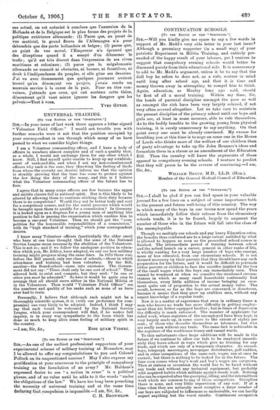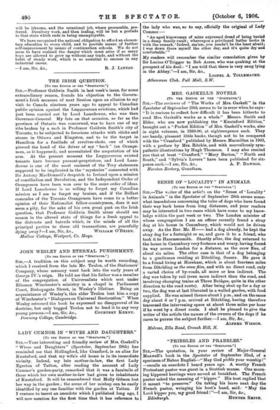[To TUZ EDITOR OF THE "SPECTATOR,"]
SIE,—I shall be glad if you can find space in your valuable journal for a few lines on a subject of some importance both to the present and future well-being of this country. The way in which many of the boys in our towns now spend the years which immediately follow their release from the elementary schools tends, it is to be feared, largely to augment the number of those who in the future will fall into the class of
the unemployable.
Though we multiply our schools and pay heavy Education-rates, the benefits thus conferred are to a large extent nullified by what is allowed to happen as soon as the prescribed school course is finished. The intermediate period of training between school and the actual launch on a career, general in other ranks of life, is wholly wanting for a very large number of boys who emerge, more or less educated, from our elementary schools. It is not deemed necessary by their parents that they should have any such preparation for the future, and it would be difficult to persuade either parents or children to face the sacrifice implied by the loss of the small wages which the boys can immediately earn. This cannot be wondered at when we consider the straitened circum- stances in which so many small households continually find themselves, every little addition of income bringing an ease- ment quite out of proportion to the actual money value. The result, however, so far as the boys are concerned, is disastrous, because it means that they grow up craftless men, without any expert knowledge of a regular trade.
Now it is a matter of experience that even in ordinary times a man who knows no trade has more difficulty in getting employ- ment than his better equipped brother ; but in times of depression the difficulty is much enhanced. The number of applicants for relief work, where registers of the unemployed have been kept, is very largely made up, in some cases to the extent of eighty per cent., of those who describe themselves as labourers, but who are really men without any trade. The same fact is noticeable in the registers of the workhouse tramp and casual wards.
To this unfortunate class large additions will be made in the future if we continue to allow our lads to be employed immedi- ately they leave school in ways which give no training for any trade, and which are only of a temporary character. As errand- boys, telegraph messengers, newspaper distributors, golf caddies, and in other occupations of the same sort, wages can at once be earned; but there is nothing to be looked for in the future. The time soon comes when boy's work and boy's wages are outgrown. Then at sixteen or seventeen the world has to be 'faced without any trade and without any technical equipment, but probably with acquired habits which militate against steady work. Nothing else can be expected after the gossiping, idling, and the intermittent work which are common to any of these occupations. Discipline there is none, and. very little supervision of any sort. If at a time when they are naturally most receptive a large number of our boys are subjected to influences so undesirable, we can hardly expect anything but the worst results. Continuous occupation
will be irksome, and the occasional job, where procurable, pre- ferred. Desultory work, and then loafing, will be but a prelude to that state which ends in being unemployable.
We have recognised the national obligation to afford an elemen- tary education to every child, and to provide means of further self-improvement by means of continuation schools. We do not seem to have realised the danger which must arise if so many boys are allowed to grow up without any trade, and without the habit of steady work, which is so essential to success in any industrial career.































































 Previous page
Previous page